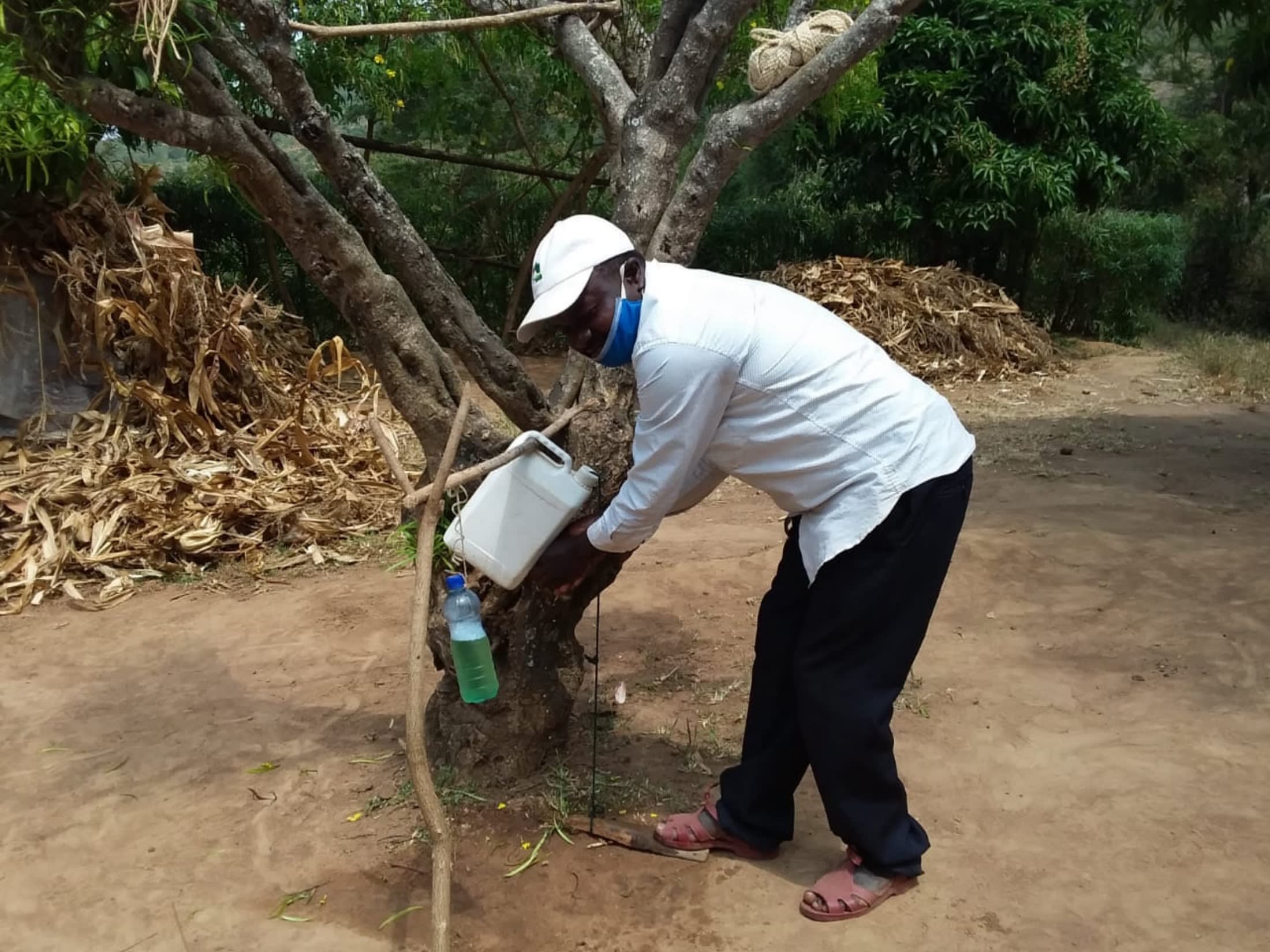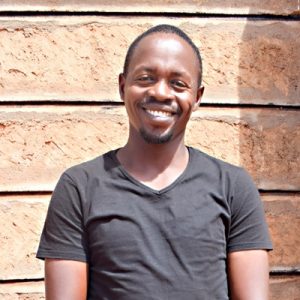Project Updates
August, 2020: Through Their Eyes: COVID-19 Chronicles with Sebastian Mumo
This post is part of a new series by The Water Project meant to highlight the perspectives and experiences of the people we serve and how the COVID-19 pandemic is impacting them. We invite you to read more of their stories here.
Our team recently visited Ilinge Community to conduct a COVID-19 prevention training (read more about it below!) and monitor their water point. Shortly after, we returned to check in on the community, offer a COVID-19 refresher training, and ask how the pandemic is affecting their lives.

It was during this most recent visit that Sebastian Mumo shared his story of how the coronavirus is impacting his life.
Field Officer Dorcas met Sebastian outside his home to conduct the interview. Both Dorcas and Sebastian observed physical distancing and other precautions throughout the visit to ensure their health and safety. The following is Sebastian's story, in his own words.
What is one thing that has changed in your community since the completion of the water project?
Water is life, and now with the sand dams and shallow wells in the community, community members' livelihoods have changed. We now plant vegetables for domestic use. Young men are making bricks the water in the sand dams. The rehabilitation of the areas was the sand dams had been constructed raising the water tables; hence water in the well is always available. We do not have to queue for long to get water. Our livestock also gets sufficient water improving their health.
How has having a clean water point helped you through the pandemic so far?
With clean water, there few cases of waterborne diseases because the water is clean and is assured that the health of my family is protected. We also have enough water to practice washing of hands.

Since the outbreak of COVID-19 in Kenya, has fetching water changed for you because of restrictions, new rules, or your concerns about the virus?
Yes, it has changed because now we have to follow government guidelines and make sure that at the different water sources, there are no many people and practice social distancing.
How has COVID-19 impacted your family?
I would, at times, do business to take care of my family, but that is now a challenge as the demand for the products I sell is low; therefore, low income and I have had to cut expenditure on buying household goods. My children are young, and now they can not go for preschool classes.

What other challenges are you experiencing due to the COVID-19 pandemic?
Meetings are restricted, affecting activities like table banking and merry go round gatherings that we attend. In the area, there are increase cases of petty theft because people do not have income.
What hygiene and sanitation steps have you and your community has taken to stop the spread of the virus?
My and family avoid crowded places and prefer staying home, we wear masks when we go out, and wash our hands with soap and water.
Like most governments around the world, the Kenyan government continues to set and adjust restrictions both nationally and regionally to help control the spread of the disease.

What restriction were you most excited to see lifted already?
The movement to Cities like Nairobi, the opening of worship places like churches
What restriction are you still looking forward to being lifted?
Opening of schools Allowing people with over 58 years old to go to church as most of them act as advisors
When asked where he receives information about COVID-19, Sebastian listed the radio, television, newspaper, loudspeaker/megaphone announcements, word of mouth, and our team's sensitization training.
What has been the most valuable part of the COVID-19 sensitization training you received from our team?
With the training, I was reminded of the importance of _wearing masks when I have visitors at home because one may not know their health status. We learned about the importance of eating healthy and continuing handwashing.

October, 2019: Giving Update: Ilinge Community Hand-Dug Well
A year ago, your generous donation helped Ilinge Community in Kenya access clean water.
There’s an incredible community of monthly donors who have come alongside you in supporting clean water in Ilinge. Month after month, their giving supports ongoing sustainability programs that help this community maintain access to safe, reliable water. Read more…

February, 2019: Ilinge Community Hand-Dug Well Project Complete
Ilinge Community, Kenya now has a new source of water thanks to your donation. A new dam was constructed on the riverbed, which will build up sand to raise the water table and naturally filter water that's accessed through this hand-dug well. Community members also attended hygiene and sanitation training, and plan to share what they learned with their families and neighbors.
Ongoing Training
The last big training held in Ilinge Community was in 2017. Community members met for three days to learn about new hygiene and sanitation practices and important health information. Follow-up visits were made later in the year to assess how households are implementing what they learned. Plans for a review training were made using the information gained during these visits and interviews, since we want to continue strengthening the community.
Community members met at Mr. Sebastian Mumo's homestead, who is the chairman of Mwanyani Self-Help Group. The members in attendance were very excited to learn. Before the training began, each member introduced themselves and mentioned a topic that they would like to review. The members were very lively and expressive during the discussions, and loved participating in hands-on demonstrations.
We reviewed the following topics:
- how to build a tippy tap handwashing station
For this topic, we discussed the tools that are required for proper construction of a tippy tap using available materials such as: a 5-liter jerrycan, 1 straight stick, 2 forked sticks, 1 meter-long thread, digging tools, a bottle of soap and a nail. Sebastian Mumo demonstrated to the rest of the members how to construct a tippy tap.

Marrietta Maingi demonstrating handwashing at the tippy tap handwashing station
- handwashing
Marrietta Maingi demonstrated how to wash hands. Members observed keenly as they watched and corrected each other. This made the topic interesting and at the end of it all the members were refreshed on how to construct a tippy tap and on the proper procedures of handwashing.
- how to make soap
The group members were also refreshed on soap-making. The purpose of this activity is to improve hygiene and sanitation as well as income generation. Members took turns to stir the soap and at the end of the activity they were able to remember the whole process. It was a whole new experience to the members who had never made liquid soap before and some said that soap-making felt like kneading flour.

Mixing soap
- water treatment methods
- personal hygiene
- latrine cleanliness
"The training was good! We have been refreshed on many things about hygiene like latrine hygiene, water treatment, and soap-making. We appreciate the efforts made to conduct this training as it helped us recall what we learned last year," said Mrs. Muthama.

Mrs. Muthama
"We are very grateful for the support. The training will help us to improve on our standards of hygiene and sanitation."
Hand-Dug Well
Construction for this new hand-dug well was successful, and there's already water flowing from the pump!
"All the group members from within are utilizing the water attained from the shallow well. It has brought about major improvements because of the proximity and water quality fetched from it. This has made us very proud of the efforts we put in towards the construction and we are very thankful for the support granted," said Mrs. Muthama.

The Process:
We delivered the experts and materials, but the community helped get an extraordinary amount of work done. They collected local materials to supplement the project, including sand and water.
A seven feet in diameter hole is excavated up to a recommended depth of 25 feet. (Most hand-dug wells don’t reach that depth due to the existence of hard rocks between 10-18 ft.). The diameter then shrinks to five feet when construction of the hand-dug well lining is completed. This lining is made of brick and mortar with perforations to allow for water to seep through.
Once the construction of the lining is level with the top of the dam, a precast concrete slab is built on top and joined to the wall using mortar. Four bolts for the hand-pump are fixed on the slab during casting. The concrete needs to dry over the course of two weeks before the pump is installed.

The well platform awaiting a thick coat of cement
The mechanics arrive to install the pump as community members watch, learning how to manage simple maintenance tasks for themselves.
The well is then given another few days after installing the pump to allow the joints to completely dry.
The pump was installed level with the top of the sand dam because as the dam matures, sand will amass until it reaches the top of the platform. Once it rains, this sand behind the dam wall will store the water to be accessed through this hand-dug well.
Thank You for making all of this possible!

January, 2019: Ilinge Community Hand-Dug Well Project Underway
A severe clean water shortage in Ilinge Community still affects hundreds of people. Thanks to your generosity, we’re working to install a nearby water system and much more.
Get to know this community through the introduction and pictures we’ve posted, and read about this water, sanitation and hygiene project. We look forward to reaching out with more good news!

July, 2018: Scheduling Construction in Ilinge Community
It won't be long before the construction of the hand-dug well begins! As you can imagine, coordinating all the people involved in this kind of project is an important factor for success. The field officers meet frequently with the community to verify that all the materials and volunteers are ready. They need to prepare accommodations for our artisans, too. Based on the last review, the community needs more time to prepare. We've adjusted the expected completion date for this project, and we look forward to keeping you updated as the artisans and trainers get to work in the coming months!

 Protected Dug Well
Protected Dug Well
 Rehabilitation Project
Rehabilitation Project































